Blog Archives
‘Sally & Tom,’ Suzan-Lori Parks’ Brilliant Play About Hemings and Jefferson, a Must-see
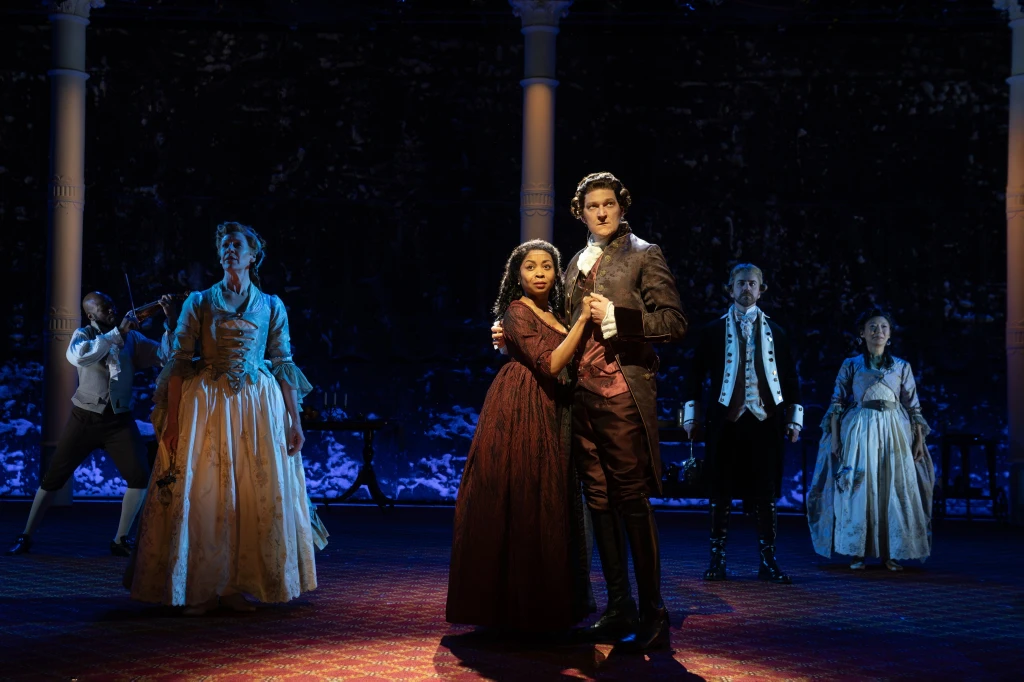
That “all humankind is created equal,” never was penned by Thomas Jefferson, nor by our most illustrious founding founders, who insured that only privileged white men with property were “equal” enough to vote. This is well noted by Suzan-Lori Parks in her satiric, New York premiere Sally & Tom, directed by Steve H. Broadnax III, currently running at the Public in its fourth extension until June 2nd.
Suzan-Lori Parks (2002 Pulitzer Prize and 2023 Tony Award winner for Best Revival of a Play for Topdog/Underdog), takes up Thomas Jefferson and fillets him for a farcical repast in this exceptional, complex new work. Examining Jefferson’s relationship with his slave mistress Sally Hemings (with whom he fathered six known children), Parks uses “their love” as fodder for her satiric cannons. She employs a play within a play structure to heighten the complexities of shedding noxious, historical, cultural notions and facing the contradictions in human behavior when attempting to do so.

During the process, where she alternates scenes from the play Pursuit of Happiness set in the past, and the actors working backstage to rehearse, revise and reconfigure the play in the present, Parks elucidates themes about racism, slavery, the patriarchy and power domination. Gradually, she reveals how the actors, and three of the technical team realize that these elements permeate their cultural attitudes in their own lives, despite their assumptions that they’ve released themselves from such bondage. Parks’ intention is for us to identify with the Good Company’s enlightenment and self-awareness toward a new “freedom.” Finally, Parks uses the occasion to expose fascinating information about “Sally and Tom” that the audience may not have known before.

Taking cues from Parks’ dialogue, Broadnax III’s setting leaps seamlessly as it alternates back and forth from 1790, Monticello, Jefferson’s plush home where the play, Pursuit of Happiness predominately takes place. Then Sally & Tom shifts to the present, backstage, and in the apartment of actors and lovers, Mike, the director, who plays Jefferson (Gabriel Ebert), and Luce, the playwright, who plays Sally (Sheria Irving). Like the characters they portray, Mike and Luce are intimate partners in their lives. Like Sally Hemings, Luce discovers she’s pregnant during the course of reworking and acting her role in the Pursuit of Happiness.
As a humorous, Mark Twain-like ironist, Suzan-Lori Parks sends up the cliche that truth in life is stranger than fiction, as the parallels between Sally and Tom and Mike and Luce blow up by the conclusion.
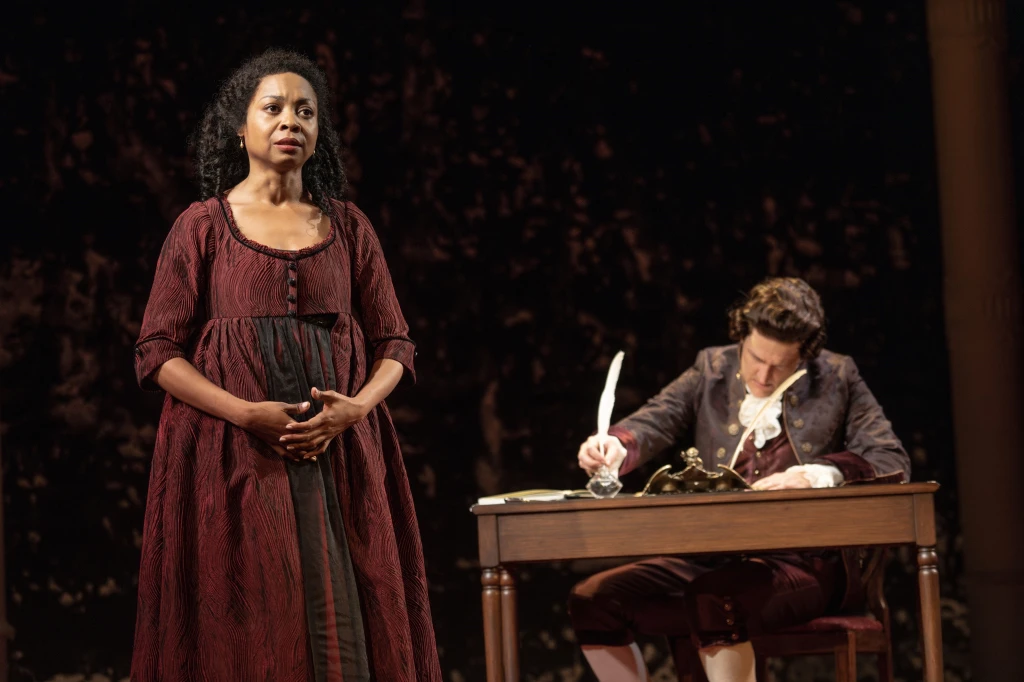
Broadnax III’s technical team crafts the sets (Riccardo Hernandez), costumes (Rodrigo Munoz), hair, wig, and make-up (J. Jared Janas & Cassie Williams), lighting (Alan C. Edwards), sound (Dan Moses Schreier), and music (composers-Parks and Dan Moses Schreier), to clarify when and where the action is unfolding. As the actors wrangle with increasingly desperate and funny problems, putting on the performance about Jefferson and Hemings, all of the characters/actors have different goals in their own pursuits of happiness. We get to see some of them blossom and others implode.
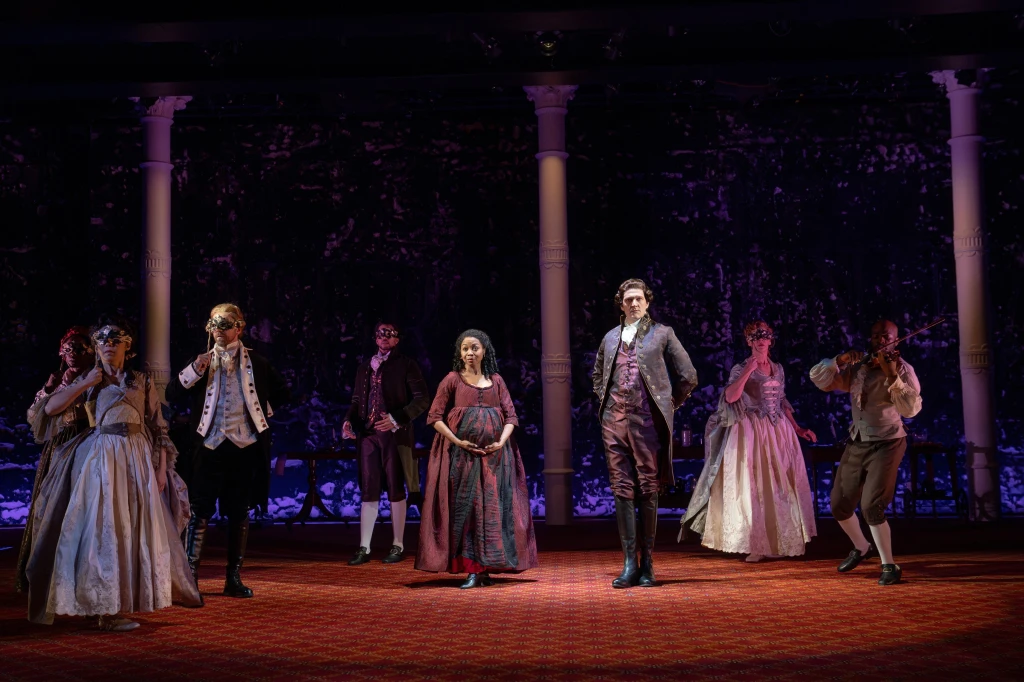
The enjoyment of Parks’ delightfully meaningful work is that one becomes immersed in both the Monticello past and the backstage present. The illusion of Jefferson’s Montocello is recreated at the top of the play as Tom and Sally dance the minuet accompanied on the violin by the slave, Nathan-actor counterpart Devon (Leland Fowler), as guests regaled in period clothes and wigs, enjoy their turns around the dance floor. As Parks exposes the colonial, repressive, anti-democratic culture of that time and stands it on its head in Pursuit of Happiness, she twits the current politically skewed theater trends presenting upbeat, nonthreatening productions, which offer “talk backs” when subjects skirt the edges of “triggering,” in order to “work through” potentially offended audience sensibilities.
Indeed, the actors of Good Company have changed their attitude toward offending audiences in this latest play to “stay alive,” and keep their company solvent. Good Company has been stretched to its limits in the past because audiences have rejected their “in-your-face” productions like “Listen Up, Whitey, Cause It’s All Your Fault.” Their producer and key financier Teddy schmoozes Luce and Mike to keep Pursuit of Happiness palatable to a diverse crowd.
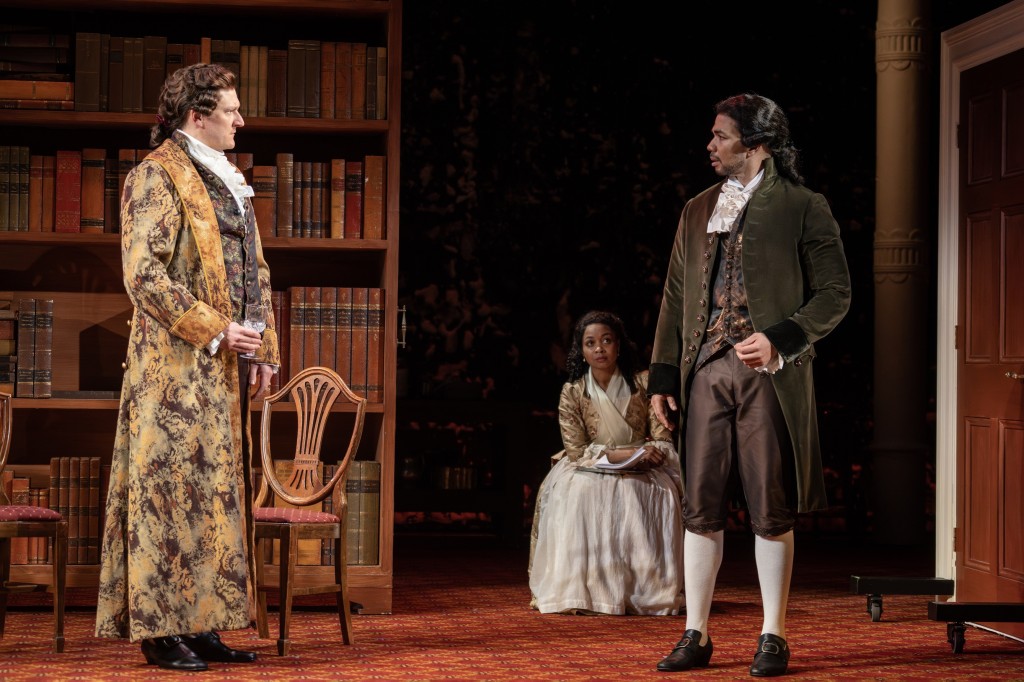
The play is heavy on accurate information. Jefferson’s “kindness” to his slaves is suggested up to a point. However, one senses the irony of a sub rosa rebellion underneath this essentially Black play which points up the scandalous “relationship” of the “good guy” Jefferson and presentation of Sally, Jefferson’s mistress, who gently gestures to her baby bump at the end of the play. Theirs was no love relationship, Luce, the playwright insists.
As the playwright Luce and director Mike rework various scenes, put in and take out inflammatory speeches, and try the patience of their producer, who eventually quits because the play is still too “in your face,” they evolve in their understanding. They are forced to modulate their impulses which reflect the present.
Some of the actors, prefer to show that the oppressed slaves had agency. In one instance, a beautiful speech is so incendiary, Teddy wants it to be removed because then, the play would be a hit and “sell,” and he’d get his money back, obviously. The point is made that during Jefferson’s time, a slave’s agency would be construed as an act of rebellion and punished with death.
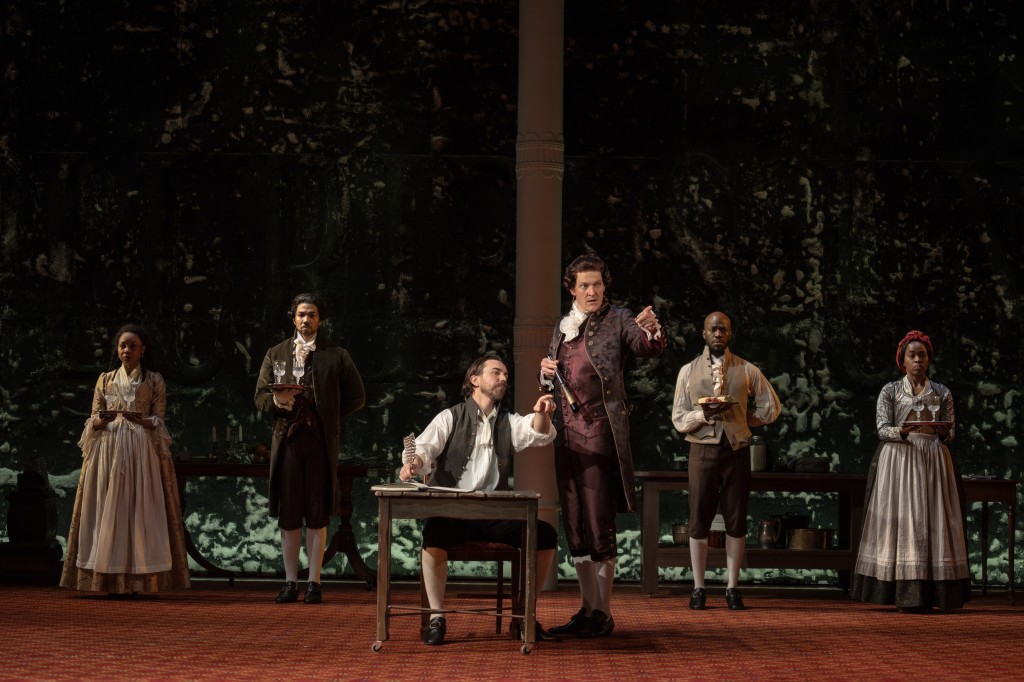
The tension between what was (the oppressive horrors of slavery), and what is (current cultural freedom especially in New York City), rocks Kwame (Alano Miller), who is on the verge of “making it” in the business. Kwame portrays Sally’s brother James, who Jefferson promised to free when they returned from Paris, where James enjoyed freedom as the other Blacks did. However, when Jefferson et. al. return to Virginia where slavery is the law of the land, Jefferson makes excuses about freeing James, because why would he do what is illegal and frowned upon by the society of his plantation peers?
James continually confronts Jefferson about his promised freedom, and stands up to Colonel Carey portrayed by Geoff (Daniel Petzold), who refers to Sally, his sister, as a “fine animal.” When Jefferson “mildly” rebuffs James telling him to “remember himself,” James holds forth in a three minute speech which producer Teddy insists must be cut.
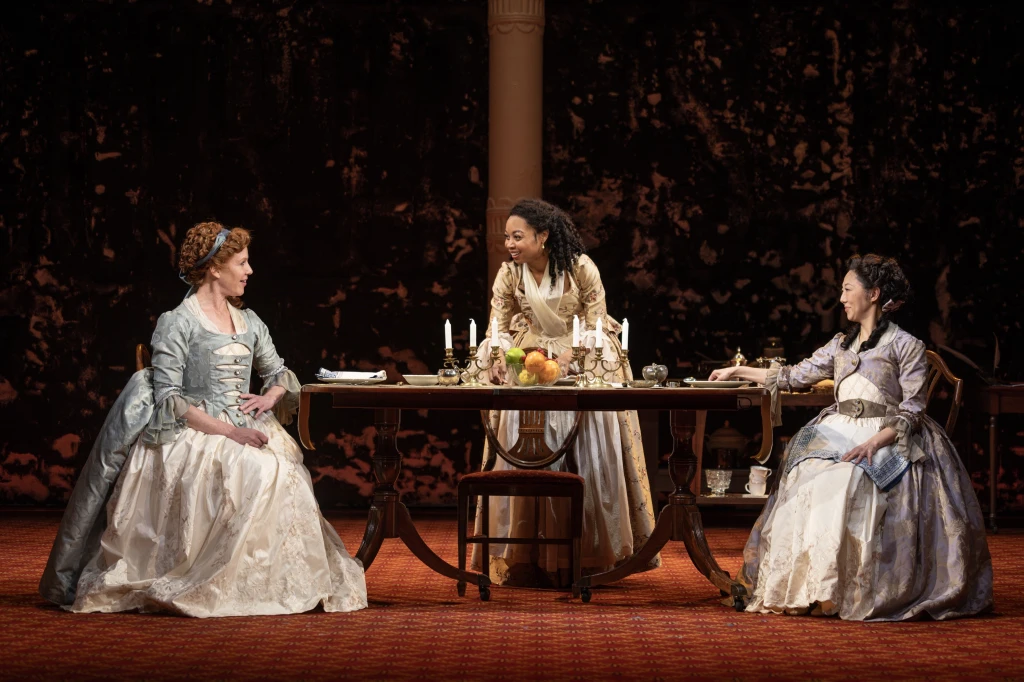
As brother James, Kwame enjoys speaking truth to power, though it is completely ridiculous for the 1790s South. It is clear that Kwame chafes at portraying a slave and feels he must redeem himself in such a role. The speech, which he delivers to “perfection” is his shining moment. The cast initially agrees and Luce, believing that Teddy is under her power, massages the producer to keep the speech and prevent Kwame from walking. Instead, Teddy quits and Mike and Luce are left with a financial abyss to fill and a long speech which makes no sense in Jefferson and the fledgling United States’ tide of times. Of course the “full of himself” Kwame believes his empowerment speech is the only value Pursuit of Happiness has.
The show, however, does go on as Mike and Luce’s relationship is sacrificed, Kwame quits, scenes are rewritten at the last minute and the acting “troopers” pull together and get to opening night. In the process, the farce unleashes and the admixture of revelation and forgiveness but not forgetfulness wins the day for the actors, and even for Sally and Tom at the “perfect” conclusion, that a sadder but wiser Luce has written for Pursuit of Happiness.

The actors are top notch in this glorious ensemble where Sun Mee Chomet, Kristolyn Lloyd and Kate Nowlin portray supporting roles. For those who gloried in founding father Thomas Jefferson’s iconic stature, Parks, speaking through Luce, pointedly suggests Sally did not love Tom. Though he supposedly was a kind master, unless one could go back in a time machine taking one’s present-day perceptions with them, it is impossible to know, given he kept 600 slaves and sold them off to raise money when he went to the Capitol, New York City. Finally, the audience is reminded that our great founding father never gave Sally her freedom. It was Jefferson’s daughter Patsy, disappointed at her father’s lascivious behavior, who finally freed Sally after Jefferson died.
If the Good Company had had their way with Teddy, who most probably insisted they change it, the title would have been E Pluribus Unum (“out of many, one”), instead of the benign Pursuit of Happiness. One would think that the implied unity has yet to be achieved in our nation, culturally fractured by foreign adversaries like Putin for politically opportunistic reasons. However, looking beyond social media posts of Marjorie Taylor Green, MAGAS, and Russian and Chinese trolls, federally, we are indeed, E Pluribus Unum, united and standing tall, while we attempt to iron out issues, as Parks points out, that are extremely complex.
Sally & Tom runs two hours, thirty-five minutes with one intermission at The Public Theater, on Lafayette Street. I loved it.
‘Pass Over’ at the August Wilson Theatre is Glorious

Two men standing on a desolate street corner with a lamppost shining on a blasted, deserted, space save for a garbage can, a patch of weeds, a tire, a wire milk carton. Such is the material/empirical setting reminiscent in its isolation and abstract loneliness of Samuel Beckett’s setting in ‘Waiting For Godot.’ Likewise the comedic and clown-like Moses (the brilliant Jon Michael Hill) and his Homie, clowning sidekick Kitch (the brilliant Namir Smallwood) appear similar to Vladimir and Estragon. However, they are not. They are black. And where Vladimir and Estragon “wait,” unafraid, bored, wiling away the hours, Moses and Kitch exist in a hellish landscape afraid of death at the hands of the “PoPos,” shorthand for police.
Whether one has seen Beckett’s Godot or not, doesn’t matter. The isolation of these two individuals and their express desires to leave this heartless existence that holds the terror of black men dying by a simulated “justice” which is tantamount to the injustice of lynching is conveyed with empathy and poignancy by the creative team of actors and director Danya Taymor. With acute care, emotional grist, comedic genius and dynamic drama, they bring to stark, felt life, Antoinette Chinonye Nwandu’s haunting, memorable dialogue in Pass Over, currently running at the August Wilson Theatre in a cool, streamlined no intermission production.

When we first meet the likable Moses and Kitch, we understand their camaraderie and support for one another, as well as the similarity of their desires, fantasizing about the finer things of a luxurious, material, elite lifestyle. Though Moses is the leader and Kitch is his follower and admirer, their synchronicity and dependency is clear, for they wish to “pass over,” to get to the “promised land,” the “land of milk and honey” represented by the “American Dream.”
And whether we have eaten lobster or drank Crystal, like they wish to, we, too, have craved the finer things of life and may even feel a sense of superiority that we have experienced them, where these impoverished of the ghetto block can only entertain themselves and each other by dreaming about such extravagances in a humorous and ironic game which has become a way of bonding between them.

Fifteen minutes in to the thrust and parry of humor, the gaming is interrupted by a Pavlovian signal that has brainwashed them to fear: the stage floods momentarily with a steely light and a dull, blaring warning sound. (It reminded me of Steven Spielberg’s 2005 film War of the Worlds, when there sounds a far-reaching alarm announcing the aliens’ presence.) We learn later that Moses and Kitch recognize this alarm as the sound of death; that another black friend or acquaintance in their neighborhood has been killed by police. They cower and crouch in fear until the light and sound normalizes to the stasis of desolation, and once again they return to humor and the grace of planning to escape and go somewhere where they can live free from fear in a greater abundance of prosperity than their current existence.
However, there are two caveats. They must elude the PoPos, as Moses led the Israelites to elude the angel of death which “passed over” the the First Born if the blood of the lamb was on the doorposts of the Israelites’ homes. Secondly, the PoPos expect them to remain on the block to never escape their oppression and misery. Thus, they are free only in their games, humor and imagination, while their physical bodies are subject to the reality of their dire existence with the threat of death hanging over their lives. Will they be able to “pass over” and escape death? The symbolism is spiritual with possibilities for escaping all of what the playwright infers elements of the death state is in this life.

Into their ghetto corner (which the playwright suggests symbolizes as historical oppression and redemption-a river’s edge, a plantation, a desert city built by slaves and a new world on the horizon) comes Mister who slips up and calls himself Master (the wonderful Gabriel Ebert). Taymor has him ironically dressed in a white suit and vest, such as gentlemen of the Old South used to wear on or off the plantation. Mister, intending to visit his ill mother with a picnic basket of food, inexplicably gets lost and arrives with his bounty to the ghetto block.
At first Moses, whom his religion teacher encouraged to live up to his namesake, the Biblical Moses, proudly eschews Mister’s offer of food charity, though both he and Kitch are hungry. However, sociable, “good-natured” Mister cajoles and tempts them. And after he massages their egos with charm and humility, he shares some of the delicious food in his basket with Moses and Kitch in a wonderfully humorous staged scene.

We note the roles between the individuals and hints of seduction and exploitation, expecting some catastrophe, however, Nwandu has tricks up her sleeve and the situation with Mister is as it appears. Mister worms his way into their hearts and they become friendly. And for a fascinating moment they forget about “getting off the block,” and being all they can be, lulled by the food. Intriguingly, Mister chides them for abusing their use of the “N” word which he cannot use, because as Moses suggests, he doesn’t own that word.
It is an ironic gesture since it is perhaps the only “thing” Mister doesn’t “own,” as a representative of the dominant oppressor race. Though Mister doesn’t “own” their black identity which they have accepted as their own, is it something which is good for them or is it another trick of oppression? After Mister leaves, Moses and Kitch realize that adopting that identity is a trick of the white culture and the PoPos, for by inference, the “N” label associates with low-down and/or slovenly criminal behavior, regardless of whether they are deserving of such labels or not. Ironically, they have proudly accepted that term as their identity, but it has resulted in black male deaths at the hands of the police.
Deciding to cover for themselves, using Mister’s gentile manners, they avoid trouble, when Ossifer (a police officer played by Gabriel Ebert who is the different side of the same coin as Mister) shows up. Moses and Kitch become “gentlemen” in word and action, imitating Mister. It works. Ossifer leaves them alone and protects them as culturally “white” until Kitch slips up and uses the “N” word triggering the brutality of the police officer who confronts them as their oppressor to control, belittle and demean. Under these circumstances we feel the depressive desolation of the historical and current inferior “slave.” And Ossifer terrorizes them reminding them that their lives are only useful for living in fear and misery as “the controlled.” The only respite Moses and Kitch have is the humor and hope Kitch and Moses stir up within themselves and share with each other to make existence bearable until they can “pass over.”

In an amazing turning point, Nwandu clarifies a new meaning for the term Moses references from the Bible, “pass over.” It is a spiritual one that Moses convinces Kitch they must now seek, no longer wanting to deal with the despair and long trial of a desolate existence.
Taymor, shepherding Hill, Smallwood and Ebert creates extreme tension throughout. Especially when Ebert as Mister and Ossifer shows up. The atmosphere is that of a pressure cooker sizzling until it seethes into an explosion which does occur. We, like Moses and Kitch, expect the blast after every joke, around every game they play, especially when the alarm sounds and lights flare up that the PoPos have killed another black man. Nwandu cleverly distorts the thrust of the heat and danger providing extraordinary twists in the turn of evolving events. These become revelatory, magical and lead to the unexpected and heartfelt.
The beauty of the conclusion is in its realization of a return to an ideal which isn’t actually some pie in the sky fantasy, but is present and real. In the production it occurs with the help of and extraordinary supernatural intervention as happened to the Biblical Moses. Taking one step forward after another, Moses, Kitch and Ossifer (a reborn Christopher) are released and the imagined consciousness comes into being. However, the lure of what’s past beckons. One must not turn around to be enticed, or everything will be lost in the material plane where the human race has crashed and burned for millennia.
Pass Over is a must see for its fantastic performances, its uniqueness, its joy, despair, thematic truths and its wonderful faith and hope in human nature. I could not help but be gratified that there were no female characters. Their absence is lyrically pointed. The production is mesmerizing and I have nothing but praise for how the playwright, director and actors connected with the truth of what we face as a multifaceted and diverse society that is desperately crying out for healing and redemption. But as Nwandu suggests, the promised land is already here. We must look to our own inner strengths and step out to cross that “river”and never turn back.
Kudos to the creative team that made this production fly and whose effects helped to send chills down my spine and tears down my face. They include Wilson Chin (scenic design) Sarafina Bush (costume design) Marcus Doshi (lighting design) and Justin Ellington (sound design). Pass Over runs until the 10th of October. This is one you cannot miss. For tickets and times go to the Pass Over website by clicking HERE.